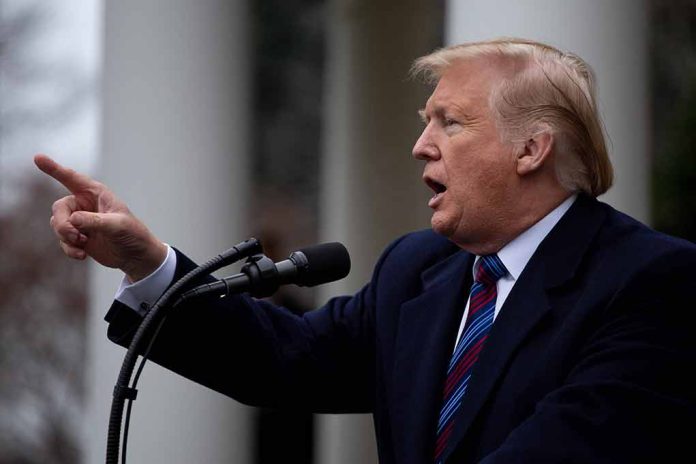
Harvard University faces an unprecedented $2.2 billion loss in federal funding as the Trump administration takes decisive action against what it describes as unchecked antisemitism and discriminatory practices at the prestigious institution.
Key Takeaways
- The Trump administration has withdrawn $2.2 billion in federal funding from Harvard University due to concerns over antisemitism and racial discrimination.
- NIH Director for Extramural Research Michelle Bulls cited Harvard’s failure to address “widespread abuse of Jewish and Israeli students” in her termination letter.
- Harvard President Alan Garber called the administration’s demands “unprecedented” and refused to comply with what he views as government overreach.
- Education Secretary Linda McMahon has advised Harvard not to apply for further federal grants as the legal battle intensifies.
- Harvard has 30 days to object and provide documentation challenging the funding termination.
Federal Government Pulls Billions in Harvard Funding
In a major blow to one of America’s most prestigious universities, the Trump administration has withdrawn $2.2 billion in federal funding from Harvard University. The decision comes after the school refused to comply with administration demands regarding antisemitism concerns and alleged discriminatory practices. On May 6, 2025, NIH Director for Extramural Research Michelle Bulls sent an official notification to Harvard President Alan Garber informing him of the funding termination, citing Harvard’s alleged failure to protect Jewish and Israeli students and address racial discrimination in its admissions processes.
The administration’s decision represents a significant escalation in an ongoing dispute between Harvard and the federal government. The Joint Task Force to Combat Anti-Semitism, established by President Trump, has specifically targeted what it describes as a “troubling entitlement mindset” within prestigious universities. Harvard’s refusal to implement demands that included auditing student viewpoints, restricting international students deemed hostile to American values, and closing diversity programs in favor of merit-based policies led directly to this funding crisis.
Harvard Rejects Government Demands
Harvard has taken a firm stance against the administration’s requirements, even filing a lawsuit challenging the initial funding freeze that preceded the full withdrawal. In a public statement, Harvard declared its refusal to capitulate to what it views as government overreach. The university maintains that the Trump administration’s demands constitute an unprecedented attempt to control academic freedom and institutional independence, principles Harvard considers non-negotiable regardless of the financial consequences.
“The university will not surrender its independence or relinquish its constitutional rights. Neither Harvard nor any other private university can allow itself to be taken over by the federal government,” said Harvard’s X account.
President Trump has shown no signs of backing down, suggesting even more severe consequences for the university if it continues to resist. In a statement that escalated the confrontation, the President suggested Harvard could potentially lose its tax-exempt status if it persists in what he characterized as pushing “political, ideological, and terrorist inspired/supporting ‘Sickness.'” This represents a significant threat to Harvard’s financial model beyond the already substantial grant funding loss.
Harvard University is suing the Trump administration one week after the federal joint antisemitism task force cut $2.2 billion in grants and contracts to the Ivy League school. | @dezward01 https://t.co/QBmlnWpkc4
— National Review (@NRO) April 22, 2025
Administration Cites Antisemitism Concerns
The administration has framed its actions as necessary measures to combat antisemitism and enforce compliance with federal standards regarding discrimination. White House spokesperson Harrison Fields emphasized President Trump’s commitment to reforming higher education by addressing what the administration views as pervasive problems in elite universities. The letter from Michelle Bulls specifically highlighted the administration’s position that supporting research in an environment where antisemitism allegedly flourishes is “plainly inconsistent with NIH’s priorities.”
“President Trump is working to Make Higher Education Great Again by ending unchecked anti-Semitism and ensuring federal taxpayer dollars do not fund Harvard’s support of dangerous racial discrimination or racially motivated violence,” said White House spokesperson Harrison Fields.
The funding withdrawal also cited concerns about the Harvard Law Review’s alleged discriminatory practices. According to the termination letter, Harvard has 30 days to object and provide documentation challenging the funding termination decision. Meanwhile, Education Secretary Linda McMahon has advised Harvard not to apply for further federal grants, suggesting that the administration’s stance against the university is firm and potentially long-lasting. This approach contrasts with Columbia University, which previously agreed to similar demands after facing funding cuts.
Broader Implications for Higher Education
This confrontation between Harvard and the Trump administration represents a significant escalation in the broader debate about the federal government’s role in regulating university policies and practices. Critics of the administration view these actions as government overreach that threatens academic freedom, while supporters praise President Trump for ensuring taxpayer dollars are not used to fund institutions that allegedly permit antisemitism or engage in racial discrimination. Harvard’s legal counsel has argued that the demands infringe on university freedoms and statutory rights.
“Supporting research in such an environment is plainly inconsistent with NIH’s priorities,” Michelle Bulls said.
As Harvard prepares its response within the 30-day window provided by the NIH, the outcome of this high-profile confrontation could establish precedents for federal intervention in higher education institutions across the country. The university now faces the difficult choice between adhering to its stated principles at enormous financial cost or compromising on issues it has framed as fundamental to academic independence. Representatives from Harvard University have been contacted for comment but have not yet provided additional statements beyond their initial rejection of the administration’s demands.
Sources:
- Trump administration freezes $2 billion after Harvard rejects demands
- Trump admin yanks $2.2 billion in federal funding from Harvard in legal battle over antisemitism on campus



